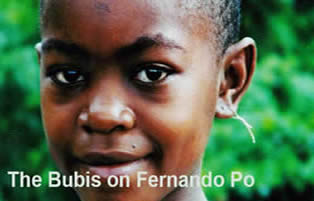.jpg)
Early 20th century Bubi woman, photographed by Father Antonio Aymemi .
(From Los Bubis on Fernando Poo)
Chapters 8 and 9: Bubi name
8. Where the Name “Bubi” Came From
The origin of the name Bubi, which we call the indigenous people of Fernando Poo, has been greatly discussed. No one can claim it is derived from the English word “booby,” meaning ignorant, clumsy, stupid, etc. Claiming that “Bubi” derives from “booby” is to argue from ignorance of the Bubi language and of the people’s true characteristics.
Everyone has close friends or acquaintances who are hard to deceive. If there is one time you might surprise or dupe them, there will not be a second time. Catching them off-guard one time certainly does not prove them foolish, stupid, or incapable of understanding. Quite the opposite is true. They quickly develop suspicion, prudence, and a clear understanding, eyes wide open, in their dealings with you. This is characteristic of the Bubi. Above all, if good faith in another person is observed, the Bubi become frank and caring. Where one could dare deduce from that such a vast misinterpretation and demeaning view shows unfamiliarity with the Bubi tribe.
The name Bubi for the indigenous people of Fernando Poo came from the Spanish. Other bapotó (foreigners), being white or dark-skinned, gave them the name of “Bubes.” Although the difference is only in the change of the “i” from “e,” calling them “Bubes” helps one better understand the name’s origin.
The Bubis, among themselves, did not originally give themselves this name. If now they call themselves “mobube” and “babube,” is because they hear it from foreigners. Further, they use the name to distinguish themselves from foreigners on the island, whom they call bapotó.
The origin of Bubis or Bubes comes from a form of a salute they generally use among strangers, saying: A boobe, oipodi (N) and A moome oibori (S). The other responds with the word Ehee (N,S) and Ehelé (SW) The “a” is emphatic and they frequently leave it out, for example: Boobe, oipodi (N); Moome or Moamecho, oibori (S). This phrase means the same as “good morning,” “good evening,” and “good afternoon,” and literally means: “Man, you have arisen already?” The other answers, “Yes.” They also may answer with: Ehee, Potohó (N) or Ehele, Potoó (S), “Yes, thank you.”
To say goodbye they say: Obaue, boobe (N); Omaue moome, (S), “Good-bye, man.” When the greeting or farewell is between persons of different sexes the male begins: Obaue boarim; oipodi boarim (N); Omaue moarim; oibori moarim (S), “Good-bye, my spouse.” “Good morning,” or “Good afternoon, my spouse.” The woman responds: Obaue, boobem; oipodi, boobem (N), Omaue, moomen; oibori, moomen (S), “Good morning,” or “Goodbye, my spouse.”
Between acquaintances of different sexes they have a custom that is strange to us. Upon meeting, a male will say to a female: boarim or moarim and the female to him: boobem or moomen. No one is scandalized by this use of words for “spouse,” for it is of general use, and no one considers the literal meaning. And not only between adults, but when an adult man takes a little girl to his breast and hugs her in his arms, he often calls her boarim or moarim. The same happens if a woman hugs a little boy. She will say to him: boobem or moomen, this is: “my spouse.”
The first time that an old woman called me molomeñi (“husband,” Bat.) I was exceedingly scandalized and annoyed with the poor thing. In noting my anger another man burst out laughing, telling me: “Don’t be mad, Father, between us it doesn’t have a suggestive meaning. The old woman who answered with this word wants only to indicate she has received many benefits and favors from you.”
It follows, then, that the use of the words boobe and moome being so frequent, it is ridiculous to look for the origin of the terms Bubi or Bube in foreign tongues.
9. What Name the Bubis Gave Themselves
It’s left demonstrated that the name Bubi or Bube does not derive from the English word “booby,” but of the indigenous boobe, which means man or male. But, what is the name that these indigenous of Fernando Poo give to themselves?
They give to the island, according to the diverse districts, the name Oche (N), Otcho (E), Oiso (NE), Oricho (S), Oncho and Aboncho (SW). These words translate to life, country, world, and nature. From these we come to words whose meaning is “person” or “rational being”: bocho, plural becho (N), boso, plural beso (Baney), mocho, plural bacho (S), and mencho, plural bancho (Batete).
A pur’olo oche (N), a pur’ol’oricho (S), a pur’ono boncho (Batete), means “still in the world of the living.” This distinguishes them from those existing in the land of the dead, called bommó (N), boribó (E), and borimó (S). Alo bommó or borimó, “already dead” or “already among the dead,” or in the region of the spirit.
Mmó or morimó does not mean devil, as is commonly believed, but human soul separated from its body. Bojula or mohula is “pure spirit.” Bajula bèbè, “good spirits or “angels,” and bajula babè, “bad spirits” or “demons.” Mmó or morimó, plural bammó or barimó, are “spirits of the ancestors,” which they venerate and worship. The Bubis consult with them and offer sacrifices to them.
So it is, then, that the indigenous of the island, to distinguish themselves from those who are not of the island, whom they call bapotó, call themselves bochoboche, plural bechoboche (N); bosoboiso, plural besoboiso (NE); boschosboricho, plural bachosboricho (E); mochomorischo, plural bachoboricho (S); menchomoboncho, plural bandiobaboncho (SW). Each translation literally is “people originally of the country,” or the indigenous.
